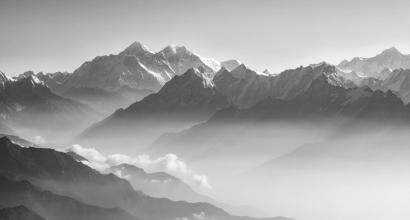The Advantage of Performing Karma
The idea that the mind becomes pure by performing karma should be examined before acceptance. Even if one is selfish while performing an ordained duty (vihita-karma), its performance by itself can gradually bring about selflessness. Whether it is a spiritual or worldly duty, even if it is done out of selfishness — if it adheres to dharma, its results are two-fold. Firstly, it turns our minds towards the divine; the second is the fulfilment of our objective. Meditation upon the divine does not need any explanation. However, there is one thing to be said about obtaining desires. Performing satkarma is required for everything — whether to procure something desirable or to get rid of something undesirable. More importantly, karma means being in contact with the world. Being in constant contact with the world trains the jīva spiritually or changes it in some way. Even such changes can benefit the jīva. Karmas, akarmas, haste, lack of judgment, profit, loss, passion, hatred, jealousy, obstinacy, separation, disease, and sorrow — these various experiences shake and jolt the jīva, make it drift about, tire it, and finally bring about the realisation of the meagre extent of the value of the world, of the plight of worldly enjoyment, and of human endeavour. We recall Bhartṛhari’s words here —
mātar-medini tāta māruta sakhe tejas-subaṃdho jala
bhrātar-vyoma nibaddha eva bhavatām antyaḥ praṇāmāñjaliḥ।
yuṣmat-saṃga-vaśopajāta-sukṛta-sphāra-sphuran-nirmala-
jñānāpāsta-samasta-moha-mahimā līye para-brahmaṇi॥Vairāgya-śataka, 100
Bhartṛhari probably realised that his life on earth was coming to an end. He then folded his hands and prayed — "O mother Earth, father Air, friend Fire, cousin Water, O Sky, who protects me like a brother, this is the last prostration to you from me". Why? "Because of your association, I was able to gain puṇya, and because of the puṇya I was able to gain pure, vast and self-effulgent knowledge of the Self.” As we come more and more in contact with the world, our delusions and infatuations are removed. Contact with the world gives us a sense of the true value of different things. Thus, we become detached from our infatuations, one by one. This is the supreme benefit of experience of association with the world. Connection with the world is one of the exercises required for the jīva. The purity of mind that is achieved by this relationship with the world is greater than that obtained by the sixteen saṃskāras. Therefore, karma is a vital instrument. Indeed, karma is synonymous with man.
Thus, a limit to selfishness is itself set by enjoying the fruit of one’s self-centered actions. Experiencing pleasure is required for the jīva, as is experiencing sorrow. Therefore, the jīva is ripened even by selfish satkarma, performed out of selfish desire. Remembering the divine and new refinement for the jīva — these are the auspicious results of satkarma. The jīva gradually ascends to higher planes of existence through multiple lives by experiencing the fruits of its actions.
Aneka-janma-saṃsiddhas-tato yāti parāṃ gatiṃ॥ BG 6.45
“Thus perfected by many lives, he attains the supreme state.”
One cannot jump to the highest plane, it has to be ascended like a staircase.
Saṃnyāsa is not easy; giving up one’s interests is not easy; giving up saṅkalpa is not easy either. Performing vihita-karma and enjoying worldly experiences through them — this is how one can earn the capacity to experience the supreme reality.
Thus, not just śrauta and smārta karmas, but all worldly duties, all transactions of life, all friendships and relationships, all physical and spiritual lending and borrowing are training for the jīva. Therefore, we can say that karma itself is life.
Atha khalu kratumayaḥ puruṣaḥ॥
puruṣo vāvayaj’aḥ॥
krato smara kṛtaggṃ smaraChāndogyopaniṣad 3.14.1
The above sentences from the Upaniṣads also mean the same. The jīva is karma itself. Karma gives spiritual training to the jīva.
Who can Perform Karma?
Every human being has the freedom to choose the karma that has to be performed, according to his capability and circumstances.
uddhared-ātmanātmānaṃ nātmānam-avasādayet।
ātmaiva hy-ātmano bandhur-ātmaiva ripur-ātmanaḥ॥ BG 6.5
If man did not have the above freedom, this saying would have been meaningless. The jīva has the freedom to elevate itself, and the freedom to choose whether or not to perform a certain karma.
Why is a person in this state now? Because he acted in a certain way in the past. One exists because of his karma, the karma that he performed in his past. The certainty that one is responsible for his future is embedded in the statement that one exists because of his karma. If a man deliberates today on what he has to do and not do, and performs only the beneficial duties prudently, his circumstances tomorrow will be excellent. In the eyes of westerners, karma is adṛṣṭa — unseen — some kind of predetermined fatalism about which one can do nothing. They opine that this is a drawback of Vedānta. But we say that it is not a drawback, but a blessing. Who is the master of your life now? You — that is, what you did yesterday. Who will be the master of your life tomorrow? You — that is, what you do today. If yesterday is the master of today, today will be the master of tomorrow. Thus, past, present, and future are continuously and wholly woven together. Therefore, whatever you have to do today, do it right. This is the essence of the statement “uddhared-ātmanātmānaṃ”. A man is the master of his future. This is the main takeaway from this chapter.
Then can we not jump once and jump hard, and take control of our future? That is not possible. Why is this? This is because the burden from the past weighs the jīva down. That burden should first be lightened. The future is endless. Just as the past does not have any beginning, the future does not have any end. The future that you desire will someday be yours. If you work towards being in the presence of the divine, that is also possible.
bahūnāṃ janmanām-ante jñānavān māṃ prapadyate। BG 7.19
If we work towards something in each life, we will obtain true knowledge over time. The meaning is this — the jīva must be trained. We have to have that goal in mind and perform karma that trains the jīva, in every life.
Śama
Now we have agreed that karma is the path to spiritual progress. Is that enough? No.
yogārūḍhasya tasyaiva śamaḥ kāraṇam-ucyate॥ BG 6.3
“Śama causes the seeker to be established in yoga.”
Śama or tranquility should join karma. Tranquility is possible by meditating on the nature of the Supreme tattva. In a nutshell, karma can train the jīva in a good way, but can also perturb it. The possibility of mental disturbance cannot be escaped even when one is engaged in worship. “You have brought only red flowers today!”, “There is not enough oil for the lamp”, “What have you prepared for the naivedya?” — thus there are many agitations in the mind.
We agreed that karma is transacting with the world. The world does not listen to our words. In a family, a wife may not be able to adjust with the nature of her husband; the husband may not follow his wife’s whims; the children may not listen to both of them; the old men are irritated by everyone. The employer does not care about the difficulties of his employee; the employee does not worry about the employer. Patient colleagues may not be capable; capable colleagues may not be patient. A man who tries to perform karma in such a world faces anxiety and mental anguish at every step. How can we keep the mind content and resolute in such circumstances?
yogasthaḥ kuru karmāṇi saṃgaṃ tyaktvā dhanaṃjaya।
siddhya-siddhyoḥ samo bhūtvā samatvaṃ yoga ucyate॥ BG 2.48
How can equanimity be possible when the surroundings are chaotic? The means for that is meditation upon the divine. If the remembrance of the divine is etched firmly in the mind, mental anguish ceases; conflict vanishes; the work we do becomes meaningful. Therefore, the majesty and glory of the divine should always be meditated upon. Then any work done will be completed to perfection. Thus for spiritual upliftment, dhyāna is also as important a means as karma.
Jñāna-vijñāna
jñāna-vijñāna-tṛptātmā kūṭastho vijitendriyaḥ।
ukta ity-ucyate yogī sama-loṣṭāśma-kāñcanaḥ॥ BG 6.8
The mind needs two kinds of intellectual wealth to be content. One is jñāna, the other is vijñāna. Jñāna here means the knowledge of the true nature of the ātmā (tattva-jñāna). It is knowledge gained by persistent effort of the intellect — knowledge obtained from reading books and listening to discourses. Vijñāna is experiencing the knowledge gained thus. Vijñāna is the experience of jñāna. One is theory — intellectual pursuit, whereas the other is practice — experiential pursuit. One has to obtain both of these and remain unperturbed by the senses. Such a man is “tṛptātmā”. One who is separate from every attribute of the jīva except the ātmā — such as the body — such a man is “kūṭasthaḥ vijitendriyaḥ”. “kūṭasthaḥ” means existing separately, and changeless like the firm anvil of a blacksmith. As William Wordsworth said about John Milton —
Thy soul was like a star and dwelt apart
London, 1802
The light should mingle with others like that of a star, but the person should stay aloof. As said previously, “padma-patram-ivāmbhasā” — one should be in the world, and yet not attached to it. That is being kūṭastha. Such a man is “yukta” — he is established in yoga. Gold and stone mean the same to him
The Method of Dhyāna
A yogi brings his senses under his control, learns to distinguish between Ātma and anātma and practises it in this world as much as possible, and is at peace.
yogī yuñjīta satatam ātmānaṃ rahasi sthitaḥ।
ekākī yata-cittātmā nirāśīr-aparigrahaḥ॥ BG 6.10
“He always unites his mind with the ātmā. He keeps his mind under control. He does not worry about earning or enjoying. He sits alone in a private place and immerses himself in dhyāna, thinking about the nature of the ātmā”.
tatraikāgraṃ manaḥ kṛtvā yata-cittendriya-kriyaḥ।
upaviśyāsane yuñjyāt yogamātma-viśuddhaye॥ BG 6.12
Dhyāna should be performed in a clean place. The seat should be firm. It should neither be too high nor too low. The flow of light and wind should not agitate but be calming. Sitting in such a place, one should focus his mind.
It is said that yoga should be practised while sitting. Even the Brahmasūtra says — "āsīnas-sambhavāt" (Brahmasūtra 4.1.7). Why should it not be done while walking? Of course, it can be done while walking if it is possible, but it is not possible! When we are walking, we constantly think about where we step next. If we meditate while lying down, we might fall asleep. We should therefore sit calmly to perform dhyāna. "yatraikāgratā tatrāviśeṣāt" — one should sit wherever the mind can concentrate. A place where the mind is calm and unlikely to wander is the right place for dhyāna.
To be continued...
The present series is a modern English translation of DVG’s Kendra Sahitya Akademi Award-winning work, Bhagavad-gītā-tātparya or Jīvana-dharma-yoga. The translators wish to express their thanks to Śatāvadhāni R Ganesh for his valuable feedback and to Hari Ravikumar for his astute edits.











































